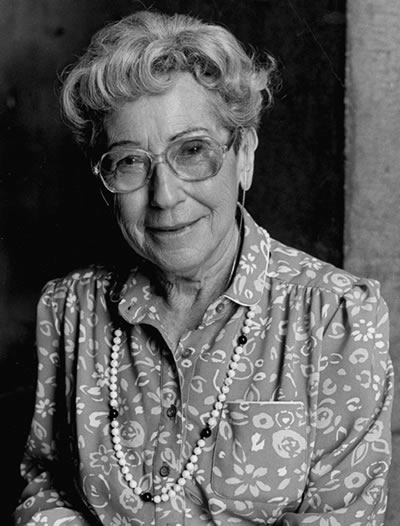 |
| “Cohn has served as a role model and advocate to younger women throughout their careers.” |
Mildred Cohn was born July 12, 1913, in New York City. She attended Hunter College, graduating with a bachelor’s degree in 1931. She earned a doctorate in physical chemistry from Columbia University in 1938. Cohn was granted honorary doctorates from at least nine schools.
Cohn’s research pioneered the use of stable isotopes to study metabolic processes as well as mechanisms of enzymatic reactions. She was among the first to apply electron spin and nuclear magnetic resonance to investigate metabolism.
After receiving her doctorate, Cohn became a research associate in the biochemistry department at George Washington University (1937-38). She then moved to Cornell University Medical School (1938-46) and to Washington University School of Medicine (1946-58). In 1958, Cohn was promoted to associate professor in biochemistry. She left St. Louis in 1960 to follow her husband to Philadelphia. She joined the faculty of the University of Pennsylvania as an associate professor of biophysics and physical biochemistry. She became a full professor the following year. Cohn retired in 1982 and is currently the Benjamin Rush Professor Emerita of Physiological Chemistry.
Her many honors and awards include the National Medal of Science, the Protein Society Stein-Moore Award and election into the National Academy of Science (1971).
Forging her career in the face of overwhelming obstacles, Mildred Cohn was one of a tiny minority of women who succeeded in science despite the odds. Even though she had an outstanding undergraduate record, she was unable to obtain a scholarship for graduate studies, and teaching assistantships were offered only to men. By living at home, babysitting and making every penny count, she managed to finance her doctoral degree. Graduating at a time when discrimination against women was rampant and jobs were scarce, Cohn spent the next 21 years a research associate. Noted for her determination, tenacity and passion for science, Cohn prevailed and garnered many scientific accolades along the way.
| “My career has been affected at every stage by the fact that I am a woman…. In my day I experienced discrimination in academia, government, and industry.” |
| … Mildred Cohn The Door in the Dream by Elga R. Wasserman Joseph Henry Press, 2000 |
Besides natural ability, Cohn attributes her scientific success to “self confidence, a supportive husband and great scientists as mentors” (from Door in the Dream by Elga Wasserman). She has served as a role model and advocate to younger women throughout their careers. Today she feels that gender discrimination is no longer overt but takes more subtle forms. Her advice to young women starting out in science or medicine is to work in a field that is new. Possessing unique skills will provide increased career opportunities and chances for success.
